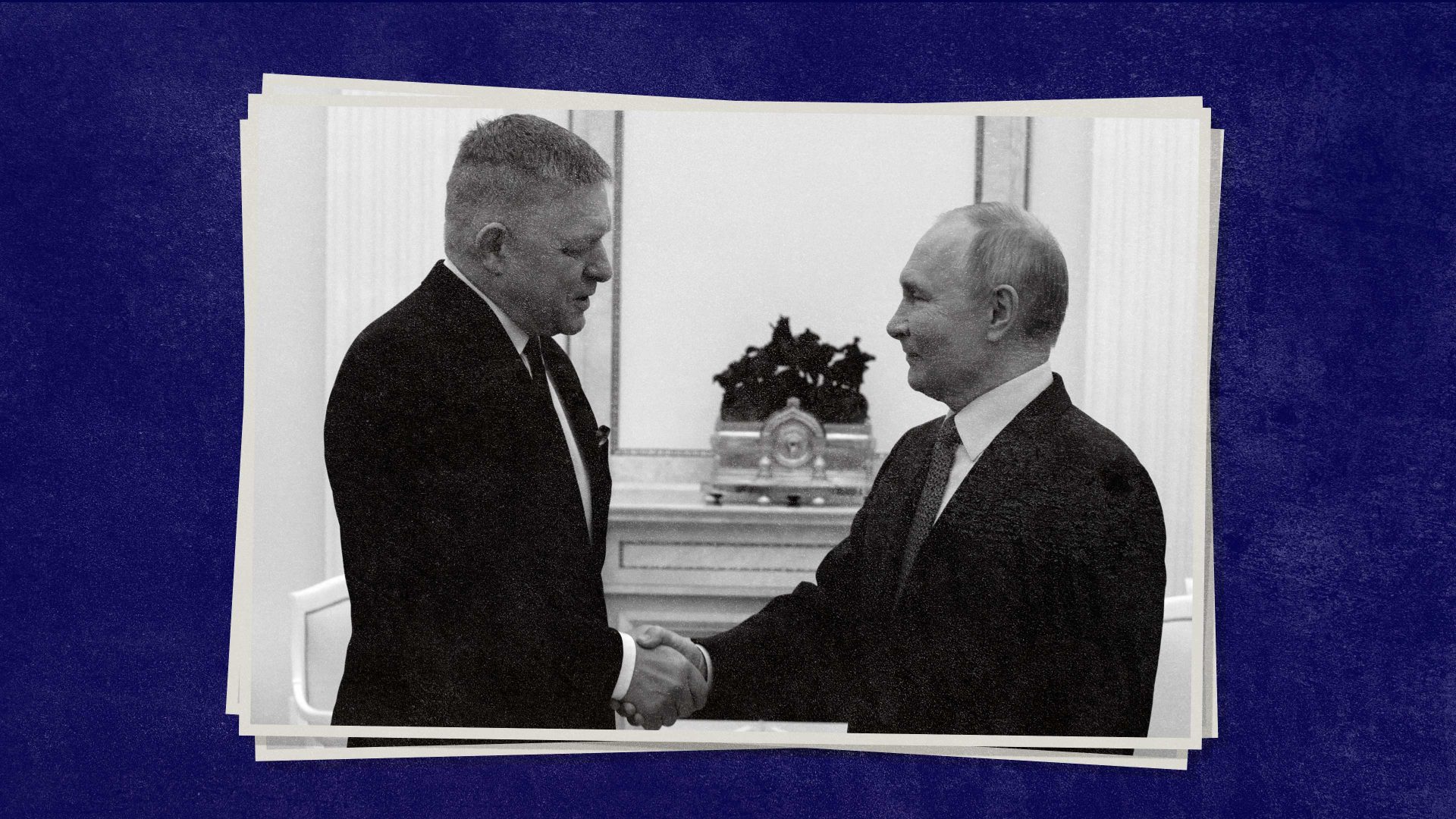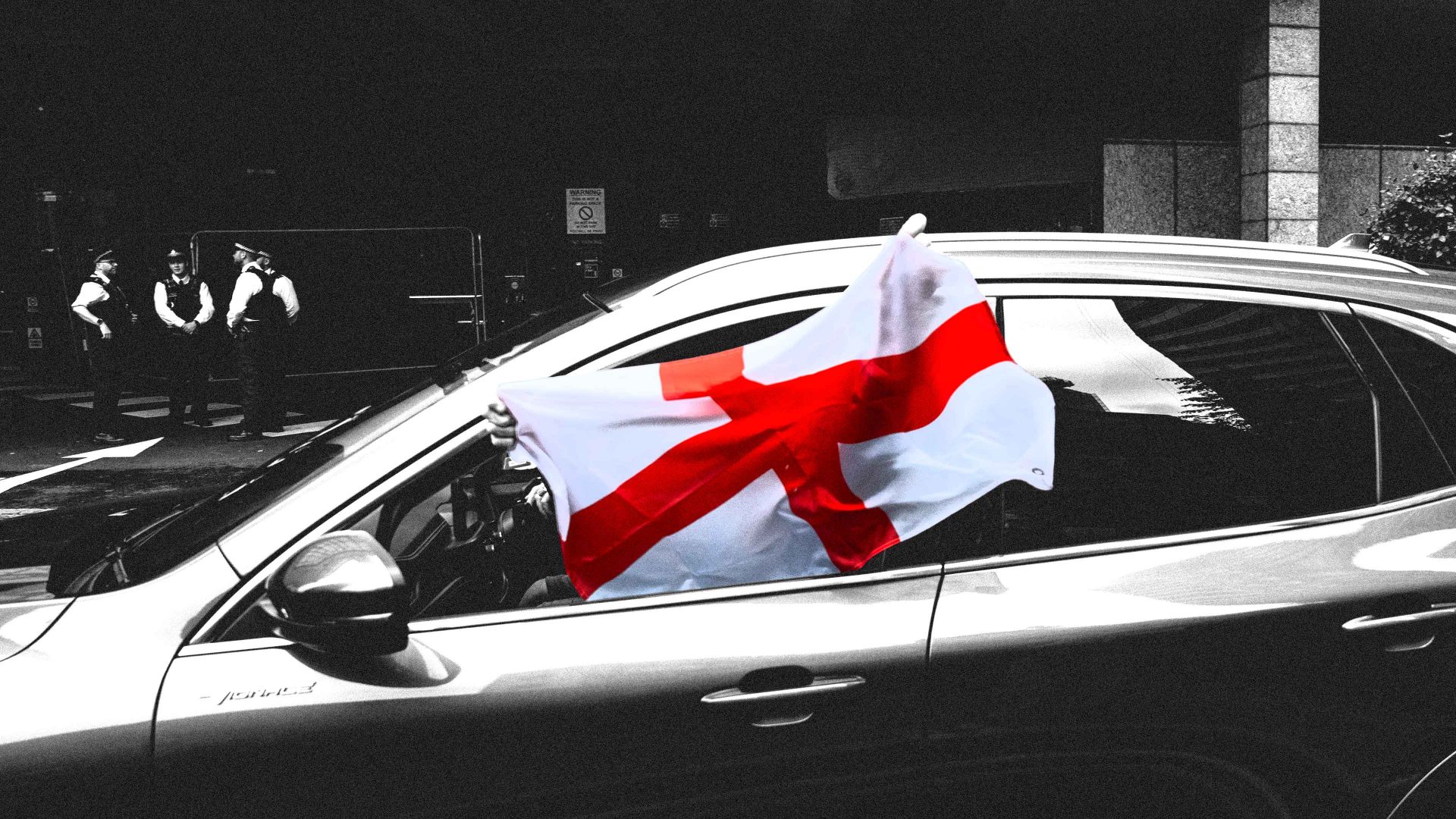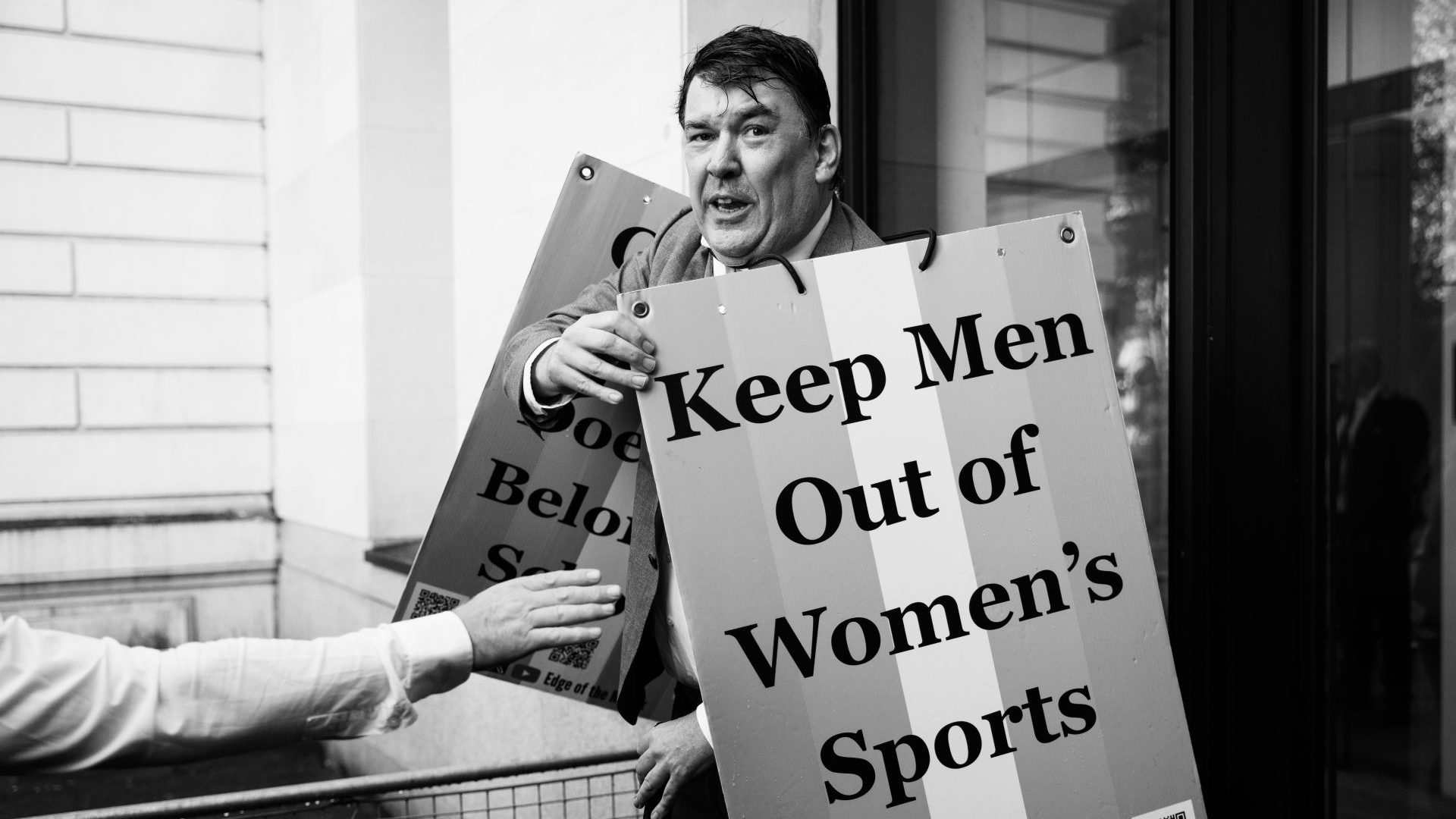Alexandra Bitusikova watched in anger. In Moscow, a thousand miles away from her home in the Slovakian city of Banská Bystrica, her country’s leader was shaking hands with Russian president Vladimir Putin. It’s rare nowadays that a leader of a western democracy pays Russia a visit, but three days before Christmas last year Slovakian prime minister Robert Fico did just that. This May he was the only European Union leader to attend Russia’s annual Victory Day celebrations.
Bitusikova, an anthropologist who grew up in what was then Czechoslovakia, remembers Moscow stationing troops across the country when it was a Soviet satellite state. When thousands of students took to the streets in November 1989 to demand an end to communist rule, she said it was the most important event of her life. Three years later, Slovakia became an independent country and Bitusikova embraced democracy. Slovakians like her turned west.
In 2023 Fico came back to power, having previously served as prime minister for a total of 10 years. Before meeting Putin last year he was already toeing Moscow’s line on certain issues, including being a vocal critic of European aid to Ukraine, where Russia has been waging a full scale war for three and a half years. But seeing a Slovak prime minister meeting with Putin turned bubbling frustration into action. Echoing events of 35 years earlier, Bitusikova and tens of thousands of others took to the streets, organising weekly protests across Slovakia against a leader they saw as dragging the country back into Russia’s orbit. The message was clear: Slovakia is part of Europe.
“The most important events in my life were in November 1989 when the communist regime collapsed. And I really, really, really enjoy being part of a democratic world. And I really will fight to my death to protect it. The situation now is the worst since 1989”, Bitusikova told me.
Not everyone in Slovakia agrees. While many younger Slovakians view Russia as an imperialist aggressor and a threat to their democracy, Fico’s base, older, less educated, rural voters, are supportive of Russia, nostalgic for a Soviet past and a sense of pan-Slavic unity. And Russia knows how to exploit it, using influence campaigns to manipulate historical memory and mould public opinion, something Fico’s party, SMER, and other pro-Russian political parties have fueled.
“Russia has very intensely been using history to gain support or maintain support for its positive image in Slovakia”, said Dominika Hajdu from the think tank Globsec. “Of course, it sort of builds on the narratives that have been shared widely as propaganda during the Soviet regime when Slovakia was part of the eastern block under the influence of the Soviet Union”.
Slovakia has become a test case for Europe. An example of how Russia’s belligerence towards the west is not just underpinned by conventional warfare, but a hybrid warfare that targets democratic societies on all fronts, including cyber attacks and disinformation campaigns. In Europe, Russia has engaged in influence campaigns to sow discord. In Slovakia, Fico is helping to dismantle democratic institutions and drive a wedge between Bratislava and its European allies. With a war raging in Ukraine and a US administration wavering on its commitment to Nato security, the dangers posed by fractures in European unity are more severe than at any time since the Cold War.
A poll conducted earlier this year by IPSOS found that just under a fifth of Slovakians wanted Russia to win the war, compared to a third of the population who backed Ukraine. Putin’s allies are a minority in the country, but when compared to the neighboring Czech Republic, where support for Russia winning is 7% compared to 44% for Ukraine, the degree of Russian support in Slovakia looks more concerning. Crucially, Fico’s base is pro-Russian enough to encourage him to pursue policies sympathetic to Moscow.
Russia has assessed Slovakia as a weak point in Europe and invested disproportionately in influence campaigns inside the country, according to Pavel Macko, a retired Slovakian general who lectures Nato allies on hybrid threats. This hybrid campaign is effective and influential because it can be conducted “without a single bullet being fired”, he said.
A big part of this influence campaign has operated on Facebook and Telegram, platforms with a lot of users in Slovakia. The Russian embassy’s Facebook page, which has over 70,000 followers, often promotes Russia’s sacrifice in helping to liberate Slovakia from a Nazi puppet state during World War Two while pumping out anti-western narratives, including the idea Putin is a saviour of traditional values, fighting so-called liberal fascism.
Fico has been remoulding Slovakia into a less democratic, more conservative society. While the country remains a democracy, rather than a Putinesque autocracy, the warning signs are there as Fico has begun eroding civil society, in particular targeting the LGBTQI+ community. His minister of culture, Martina Simkovicova, whose Slovak National Party is part of the governing coalition, has gone to war against “LGBT+ ideology”, and is accused of purging cultural institutions.
A recent mission to Slovakia made up of several members of the European Parliament’s civil liberties committee concluded that it was concerned about a weakening of anti-corruption measures, parliamentary oversight, judicial independence, media freedom and individual liberties inside the country.
In particular they cited a proposed constitutional amendment, planned for later this year, to assert the supremacy of Slovak law over international law on identity issues, as well as to limit adoption rights to heterosexual married couples. “Is Slovakia on a path to become the next Hungary?” asked Sophie Wilmés, a European parliamentarian while presenting the findings. “Some patterns are strikingly similar”.
The same can be said of Slovakia’s foreign policy. Like Hungary, Bratislava has dragged its feet on imposing sanctions on Russia over its war in Ukraine. In a recent standoff between Bratislava and Brussels, Fico’s government refused to sign a new suite of sanctions as he opposed a separate plan to phase out the use of Russian gas and oil by European Union member states. Eventually Fico budged and on 17 July announced he would agree to the sanctions package.
The delays are part of an attempt to garner support among Fico’s base at a time when his administration’s austerity measures are affecting the population as a whole, according to Jozef Hrabina, a Slovakian geopolitical risk advisor.
Suggested Reading

Does China have its eye on Siberia?
On the face of it, Fico’s u-turn is an indication that ultimately the state will accede to its EU and Nato allies’ demands. There is a gap between the administration’s actions and words: Fico often talks tough but will eventually toe the line. But Slovakia has gained very little from the standoff apart from a three-page letter from Ursula von der Leyen, president of the European Commission, providing basic reassurances about the separate Russian oil and gas phase-out plan.
Russia has gained because the delay gives them more time before the new sanctions come into effect. It also helps Putin by driving a wedge between Slovakia and the EU, reducing their cooperation on key issues like intelligence sharing.
Officials in Brussels are very frustrated, but have few options apart from potentially changing the voting system to give Slovakia less power, said Hrabina, who was with EU officials during the recent sanctions debacle. “Witnessing that level of frustration that was happening in Brussels, and listening to internal discussions of some high level bureaucrats, I think they’re leading to this option”, he said.
This is a double-edged sword. To do nothing allows Fico and others to continue thwarting European unity. To act could fuel frustration inside Slovakia with the EU, which is seen by some as an overbearing foreign power. Either way Putin gains something, which is why his strategy to win hearts and minds in Slovakia while creating divisions within the country and between its allies is so effective.
For the EU, tackling Russian influence campaigns is urgent. Doing so can create its own problems. Russia’s disinformation networks often work by amplifying pre-existing grievances and sentiments held by ordinary citizens. Attempts to confront those narratives can be perceived as an attack on free speech.
“The real issue is, and this is what the Russians are utilising, they are looking at the seams, they are looking at the organic deficits in our societies, in our systems, in our institutions, and they’re just expanding them”, said the retired general Macko. “So sometimes it’s really difficult because if you try to crush it down and do it more proactively, you are at the edge of suppressing freedom of speech”.
It is a problem faced by most European democracies. Populist parties are in the ascendant, some seeking to turn their countries into states where strongmen, nativism and conservatism reign, by reshaping values and historical memory. The US, the main guarantor of European security, is a case in point.
After signalling his “dissapointment” with Putin, Trump recently threatened to start sending weapons to Kyiv and impose heavier tariffs on Russia unless it ends the fighting in Ukraine. He has since said he is on “nobody’s side” and that he will not give Ukraine long-range missiles. This flip flopping emboldens leaders like Fico who have their own reservations about providing support to Ukraine. Two days after Trump called Ukrainian prime minister Volodymyr Zelensky a “dictator”, Fico told the Conservative Political Action Conference that Trump’s “determination” in entering “the peace process in Ukraine is admirable”.
Trump is not taking the danger posed by Russia seriously enough, said Macko, who believes his administration is increasing the threat by undermining the intelligence services who present the best bulwark against Russia’s hybrid threats. But Macko believes America’s allies are more attuned to the risks. “Nato-wide there is a quite clear understanding that this is an extensional threat because it can completely dissolve our values, dissolve our societies from the inside,” he said.
Which direction Fico takes Slovakia next is dependent on these wider geopolitical considerations. It is a small state that may feel most secure by continuing to sit on the fence, attempting to balance its relationships with Russia, the US and Europe. What is clear is that Fico’s administration and its allies increasingly have more ideologically in common with Putin, Trump and Orban.
“I’m not sure whether they’re just useful idiots or actually funded by the Kremlin, but either way, they’re undermining EU unity in support of Ukraine,” Tomáš Zdechovský, a Czech member of the European Parliament who was on the recent mission to Bratislava, wrote to me.
Inside Slovakia, Bitusikova and others are fully alive to that threat. The protests, which once attracted tens of thousands, slowly fizzled out. Bitusikova is determined to continue fighting. She sees hope in the fact that civil society in Slovakia is far more resilient than in the past.
“We have learned to be a civil society, because in 1989 we were not used to that,” she said. “Everything was controlled by the communist party.”
Frankie Vetch is a former staff writer at Coda Story in Istanbul, and has written for The Times, The Telegraph and Vogue, and worked with the open source intelligence team at CNN International



